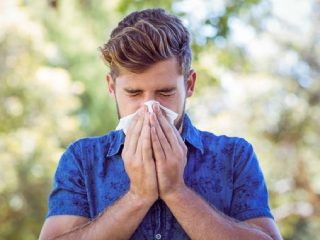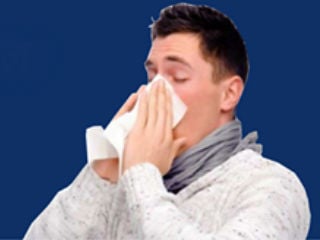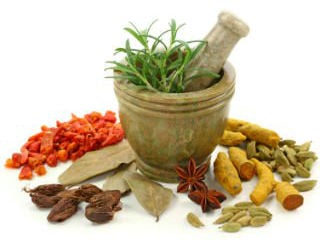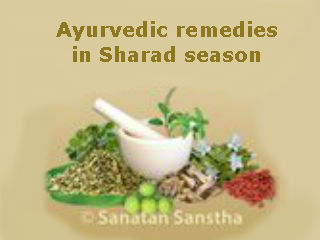1. A healthful winter
Due to the cold weather in winter, the skin pores get blocked. As a result the heat in the body gets suppressed causing its manifestation in the abdomen. Since the ability and strength of the body to combat disease is dependant on the heat (agni) in the body they too are good in this season. Hence during approximately the four months of winter basic health remains excellent.
2. Diet based on the season
2A. Dietary indications and contraindications in the winter

As in this season the fire of the abdomen (jatharagni) is excellent any kind of food is digested easily. Hence in this season there are not too many dietary restrictions. As nights are longer you feel hungry as soon as you wake up.
Hence Ayurveda advises eating a full meal to your heart’s content after the morning ablutions. As dryness grows in winter ingredients such as sesame seeds, groundnuts, coconut should be bountiful in food.That is the reason for the custom of distributing tilgul (sugar coated sesame seeds) in this season. Eat nutritive and suitable foods during this season and improve health. As eating between meals is deleterious to health eat well twice a day at a fixed time, to prevent hunger later. To improve digestion after a meal eat betel leaf and betelnut (vida).
2B. Cold water from the cooler is detrimental to health
Drinking chilled water from the refrigerator or cooler in any season is detrimental to health. It reduces the digestive capacity and gives rise to diseases such as cold, cough, joint pain and defects such as laziness.
3.Other conduct to be adopted in winter
3A. Waking up at Brahmamuhurt (auspicious time at dawn)
Due to the cold in this season you feel like sleeping longer but ideally you should wake up at Brahmamuhurt (an hour and a half before sunrise). Waking up at this time every day is an act which keeps you disease-free.
3B. Inhalation of fumes of ayurvedic medicines
In the morning after brushing teeth inhale fumes of herbal medicines. This serves as a deterrent to diseases such as cold, cough etc. Make a bidi (roll) using paper and fill with ajwain powder (carom seeds powder). Light one end and take three puffs of the fumes from the other end through the nose and exhale from the mouth. Tulsi leaf powder can also be used.
3C. Regular massage of the body with oil before a bath
In this season always apply either coconut oil, sesame oil, cotton seed oil, groundnut oil or mustard oil to the body. It prevents drying of skin and its consequences such as itching and cracking of skin, chapping of lips, fissuring of soles etc. Though coconut oil is cooling and mustard oil heat generating, in winter coconut oil is not harmful. In fact in those who have problems of heat toxicity it proves vey useful. Instead of using expensive and artificial agents such as petroleum jelly and cold cream, natural and cheap oils are more beneficial to the skin.
3D. Exercise
In winter perform a lot of exercise and do hard work. Massage the body with oil, then perform exercise and bathe half an hour later after the exercise.
3E. Bath
In this season bathe with hot water.
3F. Clothing
Wear warm clothing for protection from the cold.
4. Strict prohibitions
Do not roam around in the early morning dew or moonlight; protect yourself from the cold, spray of water on the body and fast breeze from the fan and do not sleep during the day. Avoid these things strictly in this season as they increase kapha (phlegm) in the body and give rise to disease.
I pray unto Deity Dhanwantari that by following the code of conduct prescribed for winter may seekers become healthy and may their faith in Ayurveda grow.
Vaidya Meghraj Paradkar, Sanatan ashram, Ramnathi, Goa
5. Causes for cold inducing
headache and remedies for it
Though the main cause for cold are viruses it manifests when the immunity of the entire body (especially cells in the mucosa of the nose) decreases.
Immunity to disease decreases with excessive physical strain, weak muscles, indigestion, frequent getting wet in the rain, getting wet with cold water daily, swimming, sleeping in an airconditioned room, drinking chilled drinks, eating excessive ice cream, sudden change in weather, cloudy weather, working in a dusty environment etc.
Symptoms of cold
Cold is of two types
1. Nasal catarrh (running nose) (sneezing, blocked nose, loss of appetite, watering nose, etc.
2. Severe cold (thick secretions through the nose, then a decrease in them, decreasing headache, lightness of the body)
General remedies
1. Prepare a paste by levigating saffron and vekhand (acorus calamus) in water and apply it to the forehead and sides of the nose.
2. When sleeping at night cover the ears and head and wear slippers during the day.
3. Foment the sides of the nose with a packet made from tying mustard, ajwain or vekhand powder in a handkerfchief.
4 .Inhale steam from a hot water kettle, also inhale eyucalyptus oil or garlic off and on.
5 Mix turmeric powder in 1 or 2 teaspoons of tulsi juice and lick it.
6. Drink a concoction made from ginger powder, black pepper, long pepper, Holy basil (tulsi), cinnamon and large mint leaves.
7. In case of high fever or bodyache drink tribhuvankirti (combination of herbs as per Ayurveda) juice or anandbhairav (combination of herbs as per Ayurveda) juice.
8. Have a light diet, fast off and on. Consume kanji made from rice cooked with ginger powder, black pepper and long pepper or a concoction of bengal gram or horse gram; or radish juice.
Remedies for the second stage of cold
1. Levigate ginger powder in milk and consume
2. Eat dry foods such as grams, barley
3. Consume a mixture of perfume ginger (shathi) gooseberry (amla) powder, long pepper, long pepper root, ginger powder and black pepper in ghee and honey.
4. For a month take I teaspoon of leadwort (chitrak), terminalia chebula (haritki) mixture twice a day.
5. Ayurveda categorises cold into four types- vata predominant, pitta predominant, kapha predominant and sannipatik. Varying symptoms and treatment for the first and second stages have been prescribed in Ayurveda.
6.Colds caused due to allergy or sinusitis have to treated accordingly but antibitiocs have no effect on such colds. If the cold progresses to the next stage and there is continuous fever then seek advice of the vaidya.
Reference : Diseases of respiratory system, Author – Dr. V.B. Athavale and Dr. Kamlesh V. Athavale
6. Three causes for disease
1. Non-acceptance, intolerance and not being habituated
Asatmya means not accepted, not tolerated, not habituated to. What is accepted and tolerated is satmya in general. With union of Satmyendriya health is good. In sasatmendriya it becomes abnormal. The external world is perceived with touch meaning that effect of all sense organs occurs through touch. Abnormality leads to disease. Effects of non-acceptance, intolerance and not being habituated to are observed from outside to the inside, directly into the mind. This point is extremely important. Knowledge affects the tiniest electron in the body. When sense organs are used excessively, wrongly, less or not at all the body processes that is processes of the three components vata, pitta and kapha and the mind become abnormal.
2. Sin of the intellect
As this mistake occurs in the mind itself the effect too occurs there. This is performing an action deliberately out of stubbornness, against the mental emotion or attitude, forsaking morality.These include audacity, excessive company of women, hurting any one irrespective of time and place, insulting anyone irrespective of the place, eating prohibited foods, drinking prohibited drinks, eating harmful food etc. Such sins affect the mind first, then the body. These sins aggravate all doshas (when all three doshas are equal the health status is good when there is an imbalance in them, the body becomes unhealthy). Sin of the intellect is both at the mental (Raja and Tama) and physical (vata, pitta, kapha) levels.
3. Effects of the nature of time influence (kal)
Effects are synonymous with kal (influence of time). Due to rain, cold, heat, last stage of an ailment when all symptoms have manifested, eating only at night (nakta), day, season and abnormal eating habits, doshas decrease, aggravate or stabilise. When doshas arise from ill health their saturation occurs. The nature of time affects both the body and mind simultaneously.
‘परिणामः काल अण्यते ।’(Parinaamaha kal anyate)
Meaning : After the influence of time (kal) is over, effects become firm.’


 Herbal, Spiritual and Musical remedies to beat the heat
Herbal, Spiritual and Musical remedies to beat the heat Are you distressed with constant sneezing ?
Are you distressed with constant sneezing ? Simple Ayurvedic remedies for common ailments in winter
Simple Ayurvedic remedies for common ailments in winter Health tips for Vasant (spring) season
Health tips for Vasant (spring) season Ayurvedic Seasonal Regimen
Ayurvedic Seasonal Regimen How to stay healthy in Autumn (Sharad ritu)?
How to stay healthy in Autumn (Sharad ritu)?